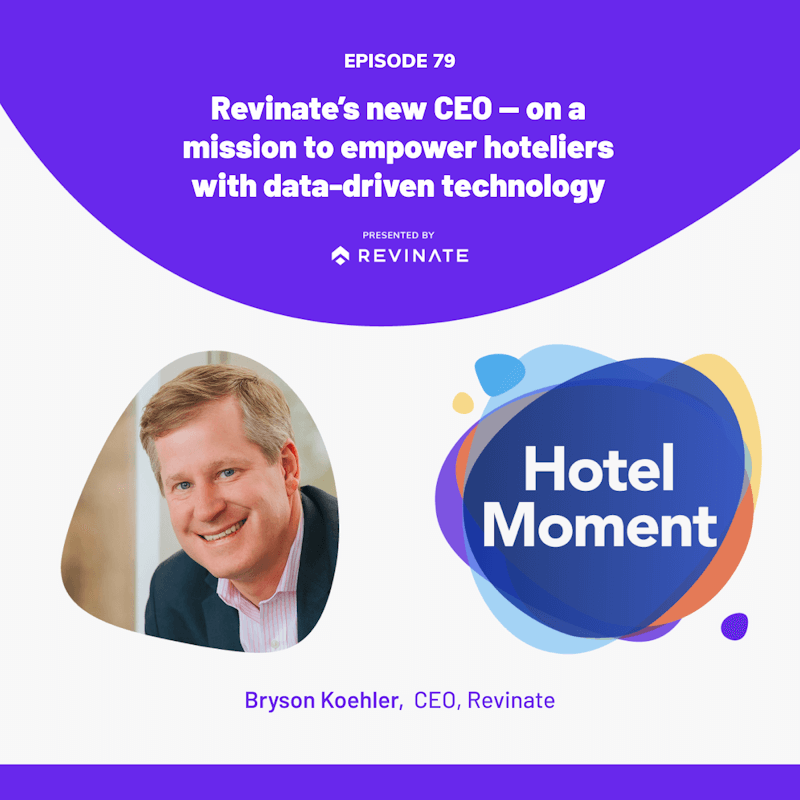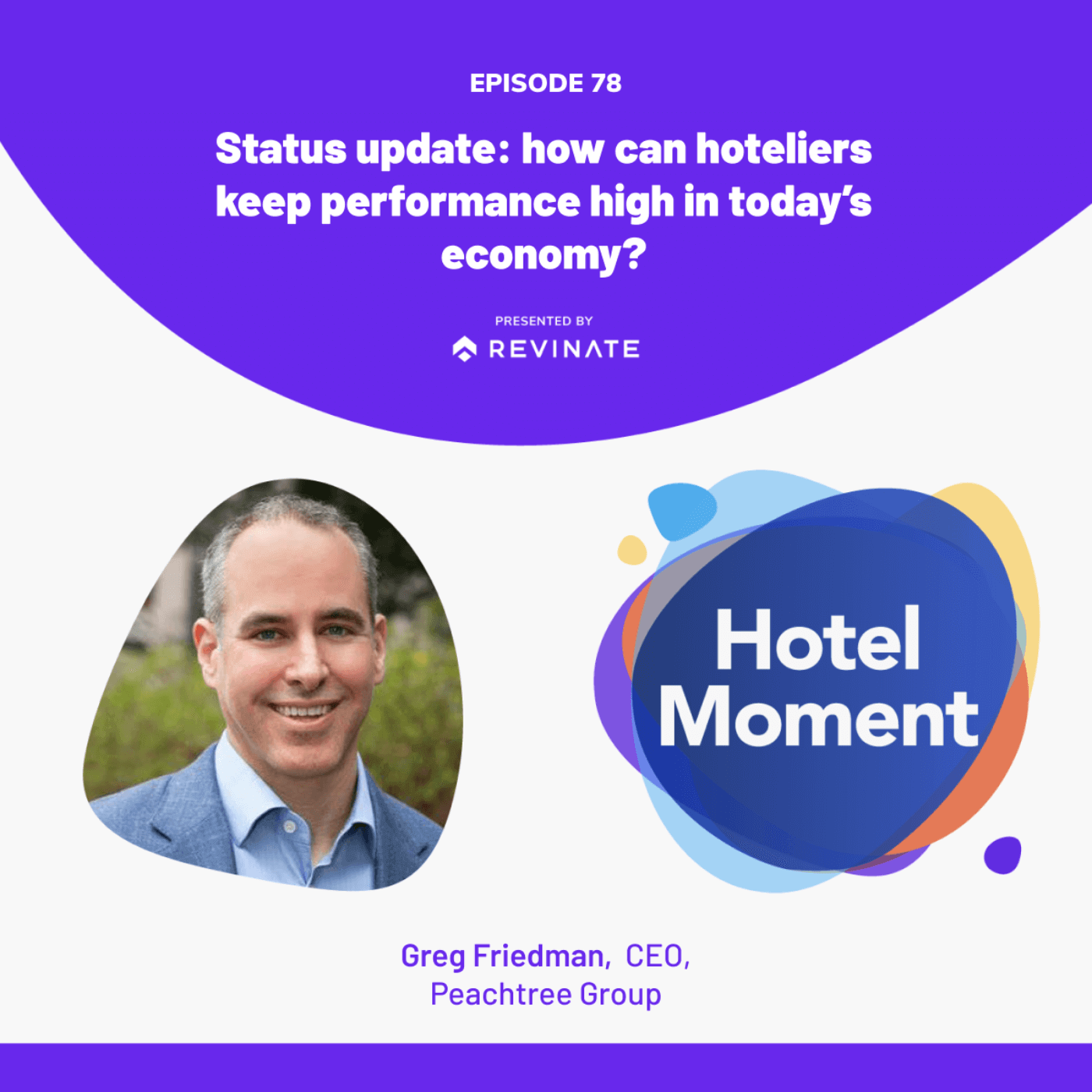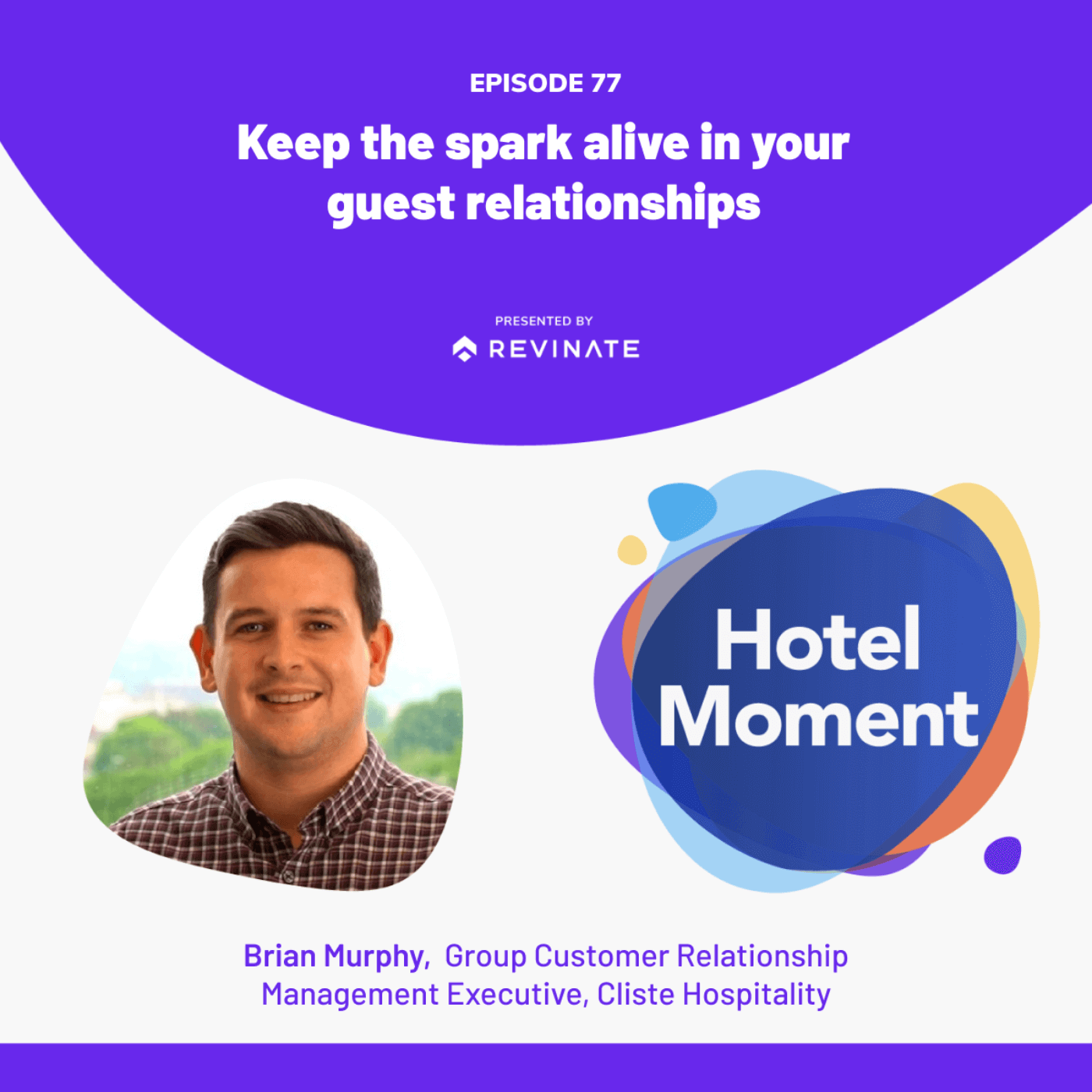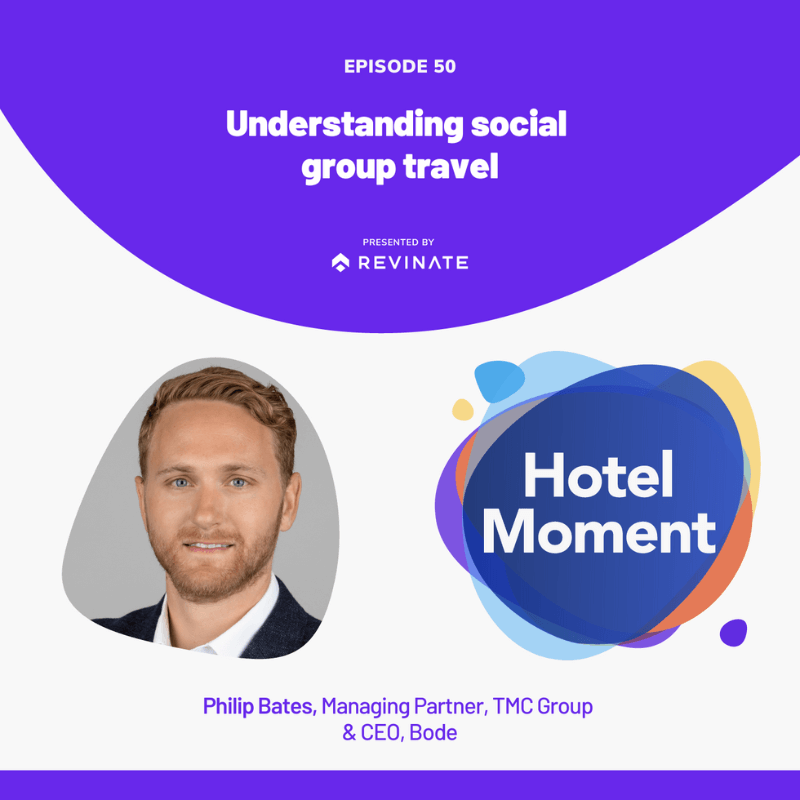

The Hotel Moment podcast — episode 50
Understanding social group travel
This week on the Hotel Moment podcast, Karen Stephens, Revinate’s CRO, and Philip Bates, Managing Partner at TMC Group, discuss social group travel and how it’s shaping up for 2023. Plus, you’ll discover how the right tech integrations can increase the quality of the guest experience for this group and what you should consider before adopting new solutions.
Listen in for a thoughtful discussion on how you can better serve social group travelers.

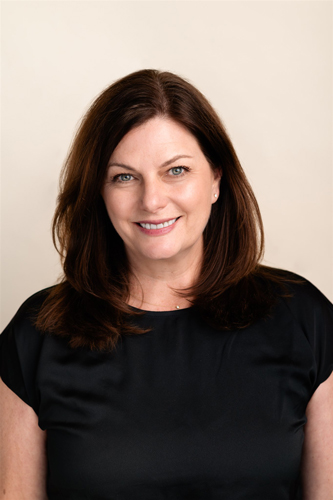
Meet your host
Karen Stephens is Revinate’s Chief Revenue Officer and runs the sales, marketing, and customer success teams. She has more than 20 years of experience in the industry alone.
On the Hotel Moment podcast, Karen speaks with leaders to draw out their experiences and insights. She is also a Francophile and Prof K — a coach, a mentor, a guide to the people who work with her.
Now Playing
Transcript
Karen Stephens: Hello and welcome everyone to the Hotel Moment podcast. I am your host, Karen Stephens, the CRO of Revinate, and I am very excited to be joined today with Philip Bates. So, Philip Bates is the CEO of TMC Hospitality. Welcome, Philip.
Philip Bates: Thank you, Karen. It’s a pleasure to be here.
Karen Stephens: It’s very exciting. We are into 2023. You are the first podcast guest of 2023, and we are ready to rock.
Philip Bates: Awesome. It’s an honor, and um, I’m happy to be in 23.
Karen Stephens: Yeah, right? 2022 was an interesting year, uh, I’m sure for all of us. Um, yeah, and we’re gonna jump into all of that good stuff. I know we have a lot to talk about. Uh, but before we get to that, I have 5 questions that I ask all of my guests. So, I was hoping we could warm up with those just so everybody gets a little bit more of an idea of, of who you are and, and what you do. Is that all right?
Philip Bates: Absolutely.
Karen Stephens: Okay, great. So the very first question, uh, when did you start working in the industry, and do you remember your very first day on the job?
Philip Bates: That’s a great one. Um, I started in 2013, and I actually started buying, started by buying Airbnbs. And so my first day on the job was um, purchasing a house in Orange County, California. And I remember kind of walking up to the lawn and being like, “What are we gonna do here?” Um, and, and, uh, and, and it was, yeah, it was fun.
We like converted it, and we, we bought FF&E, and we figured out how to market it, and it was, it, it ended up being pretty cool. It’s a, it’s a good memory.
Karen Stephens: Wow. That’s really cool. You know what, I actually have an Airbnb myself. I have a, a cabin up in Tahoe, um, that I used to live in.
Philip Bates: Oh, great market.
Karen Stephens: Yeah, it’s fantastic. But it’s, wow, that’s, it’s really a crash course in revenue management, and yeah. Um, hospitality from the ground up. That’s great. So how many, how, how many Airbnb visas did you end up with ultimately when you started there?
Philip Bates: I had, uh, 30. I, I, uh.
Karen Stephens: Wow.
Philip Bates: Yeah, we, um, I, I, you probably would’ve run into this in Tahoe.
Um, we really got ’em going and, but then I just started noticing like, “oh, wow, like the cities don’t really like this.” Sometimes the residents get bothered in the neighborhood, and ultimately that, that kind of just took the love out of it for me because I just was like, “I don’t really want to be keeping my neighbors up at night if some random guest decides to be loud that I can’t control that.”
It’s a little harder to keep a grip on that when your rooms, your rooms, are kind of disparate. But yeah, we got up to 30. Um, at that time I was actually wanting to get to thousands, and go all over the nation. Um, but I, I stopped at 30, sold ’em, and then got into hotels.
Karen Stephens: Wow. That’s interesting. And what was your first leap into hotels? So how did you make that, that cross?
Philip Bates: Well um, so in the city I was in, we, we were largely in San Diego, Palm Springs, and Anaheim. And all of those cities, probably similar to Tahoe, like in 2013 and 2014, they were very pro Airbnb. They were incorporating the tax revenue into their future planning for the city, and it was a good thing. But, very, very quickly, uh, residents started complaining. And so when I saw that occur, I thought, you know, I don’t know how long Airbnbs can be kind of professional year-round investments, and I’d like to take the Airbnb product and kind of put it into a hotel where you get rid of the impact on the neighbors, but you still provide that accommodation that I think is kind of underserved in the, in the marketplace right now.
Karen Stephens: Right. And I wanna get into that definitely when we get into this, when we talk about social group travel. So we’ll put a pin in that for sure. We’ll come back to that.
Okay. Next question for you. So what is the most uplifting moment so far in your career?
Philip Bates: Oh man, you, you have good ones.
Karen Stephens: I know, zingers, right?
Philip Bates: The most popular I know, um, in my career. Um, I think I, you know, uh, the, the, I think, um, there’s a lot. Um, but one was pretty cool. We developed a hotel in Mexico and bringing my, uh, 2 sons to it was pretty cool.
They were kinda like, “oh this is where you’ve been going.” Like they, they, they just didn’t really, they’re younger. They’re kind of like, they’re, um, at the time they would’ve been 4 and 6, and so they, um,
Karen Stephens: Right.
Philip Bates: I would just disappear, you know, and they wouldn’t really know what I was doing. Um, and kind of having them walk around and like the staff, you know, give ’em special treats and things like that. And, uh, that was pretty cool. Um, but, you know, the business itself just lends itself to a lot of really rewarding moments because you’re always interacting with people, and you can make their days, you can make your employees’ days, you can make their holiday, you can make their, you know, family vacation, et cetera.
And I think that’s one of just generally the special things about hospitality.
Karen Stephens: Absolutely love this industry. There’s so many opportunities for that. That’s right. Okay, so here’s another one. What’s your most striking experience so far in terms of food or a stay or, or a holiday that you’ve done personally?
So when you do get to spend time with your family and take ’em, take ’em out. Where, what’s your, a good moment or a memory that you’ve done so far?
Philip Bates: Oh, you know, um, we are, we are really, my wife and I, um, we, we like, travel is our thing. And so like all our discretionary spending goes into like trips. And I would say it’s probably a tie between, um, this kind of beachfront villa we rented in Thailand where um, just the service was, was, insane. We had like a little punch pool in the front, and you’re right on the sand, that it was the softest sand I ever felt. It was like flour, um, on your feet. Yeah, just like so soothing and, um, that or, or a, um, very, ornate, is kind of the wrong word, but just very detail oriented, uh, boutique hotel we stayed in, in Istanbul, um, where, you know, as is common in the Middle Eastern sort of architectural and design, they just have, they’ll put a million, you know, small little tiles on one wall, and it’s just so stunning when you look at it both up near and from afar.
So I’d say it’s probably a tie between those.
Karen Stephens: Wow. Those are great. I love Istanbul. It is one of my favorite cities. Um, yeah. As you said, just so beautiful, visually, so beautiful, and so interesting. Mm-hmm. And then the food is unbelievable. Oh yeah. Yeah. And I love a beach vacation, so I’m on board with you for both of those. Those are good.
All right. We only have 2 more. And they’re easy. They’re easy. This one’s super easy. So have you met any celebrities while you were in the trenches? Anybody come to mind so far?
Philip Bates: Yeah, I’ve met a couple. I met, um, I was working on a, a hotel in Miami, and I, I got to hang out with John Legend for a little while.
That was cool. Um, and, um, who else would I have come across? Oh, actually I had a really cool experience in Nashville. There’s a, uh, um, a singer-songwriter I like named Peter Bradley Adams, and we were kind of hosting an event. And then, um, one of my friends was like, “hey, I wanna introduce you to my friend Peter.” And it was like this musician I’ve been following for years and I had no idea what he looked like.
And um, I got to meet him there on the property. So that was pretty cool. I was like, “Pete, that’s awesome.” Like, he introduced himself with that name. And I was like, “that’s very odd you had introduced like with your middle name.” And so I was like, “you’re not a singer, are you?” And he was like, “oh, yeah.” Anyhow, it was cool.
Karen Stephens: That is very cool. That’s nice. Ah, great. Okay, last one. Who are the women at work you’ve been inspired by? So do any women come to mind, um, that you’ve worked with over the past few years? Either, you know, directly or collaboratively?
Philip Bates: Yes, yes. Um, 3 come to mind. We have an advisor named Glen Appel, who’s, who’s just wonderful, um, woman in the industry who, um, really ties together a lot of skillsets that I think are hard to find in anyone. Um, she understands design and service. She understands finance and kind of development. So she’s an advisor to our company and, um, she inspires me often.
But I think the one who probably wins the most is our general manager, Christina, um, our Drift Mexico property.
I actually met her, um, when we were having trouble during construction. I wasn’t happy with our, uh, construction project manager, so I fired him. And then someone introduced me to her and she’s this like petite, very well dressed woman and, and, and the construction world in Mexico, and there’s a lot of machismo and all that kind of stuff, and she shows up to the site in like Prada sandal or Prada, like slippers, and like whipped those guys into shape.
Karen Stephens: Nice.
Philip Bates: So much so that I was like, “hey, do you wanna be our general manager, uh, afterwards?” and she did. And she’s been with us for 2 years now. And, and she, uh, she’s awesome. She’s really tough.
Karen Stephens: Oh, that’s great. I love that story. Fantastic. All right, cool. Well, thank you so much for that. That was a great warmup. Um, so I’d love to get in a little bit more. Tell us a little bit more about TMC Group. So I know you’ve got 2 distinct brands in there, but can you just give our listeners a little bit of an idea of what the group is, and the brands within there?
Philip Bates: Yeah, for sure. So the reason we kind of funnel things up to TMC, um, is that we also do development. So every one of our projects we’re either the sole developer on it, or we’re kind of co-developing it. And, you know, that doesn’t really have much of a brand because it’s largely a company that just kind of buys and invests in property. Our consumer-facing brands are Bode and Drift, and so within TMC we, we essentially have, um, we have a development arm and then we have branded hotel management arm. Um, and to kind of give that a blanket name, we call that TMC Hospitality.
Karen Stephens: Ok, got it. Got it. And then you, you talked a little bit about, it was really interesting for me to hear, um, that your background started with Airbnb and, uh, because I had been reading some of the quotes that you had about social group travel, so I thought, “oh, okay. Well maybe”, you know, first of all, I was, I was gonna ask you anyway to define for us what that was, but I think now I have a better idea. But please tell everybody what is social group travel, and how do your brands kind of cater to that?
Philip Bates: Yeah. Um, well, social group travel, we kinda loosely define it as parties of 3 or more who are, who are traveling together.
Um, it tends to skew a little more leisure, but, but we are definitely starting to see an uptick in, in business travelers traveling in this way, whether it’s to collaborate or to do an, an executive leadership offsite or something like that. And what we found kind of in our research and in exploring in the Airbnb space is that, when you think about the actual hotel, um, particularly in America, um, it was actually largely built, like when you think about Conrad Hilton kind of going out and starting Hilton and all that, it was, they were built around, they were built for the wealthy, and they were built for the traveling business person. That largely, actually some of Conrad Hilton’s first ones, I think from his book, if I recall, were like, almost like hostile. It was like, a floor with like beds, and like curtains. Like, think about like a World War 2, like hospital ward, kind of almost like that, right?
And then like we upgraded to, you know, to individual rooms, and, um, and no one really kind of paid attention to the social group. And I, and I think things like Airbnb, and HomeAway, and really the internet, and good photography, and technology really kind of unlocked this huge segment of travel of people who like to travel with families, like to travel with groups of friends, colleagues, who really had nowhere to go, and Airbnb kind of became an outlet for that.
Um, and we said, well, maybe we can make a hotel for that. Um, and kind of combine the best of both worlds of what do people love about hotels, let’s bring that in. And then what do people love about Airbnbs? Let’s bring that in. And we think this is a really good moment in time for hospitality to kind of take another leap forward into how, um, better accommodations and experiences are offered in the, in the industry.
Karen Stephens: Yeah. That’s great. So can you gimme an example of how you bring those 2 worlds together? So, do you have a lot of community spaces? Do you have more suites? Like what is the, the structure that lends to that social group dynamic?
Philip Bates: Yeah, for sure. So I’m in, I’m actually in Palm Springs right now, touring, touring, um, 1 of our hotels that’ll open in February. And in that hotel, just from the room perspective, you can rent a regular hotel room, which is, you know, 325 feet, has a, has a, you know, a, a desk, a king size bed, a full walk-in shower, um, everything you would get from a nice hotel room. But then we also have 2 bedroom units that will have 2 hotel rooms connecting directly into a living room with a kitchen, with a spacious balcony. Um, so 2 couples could, could rent that, or parents with children could rent. Or just 2 friends could, could rent that. Um, and then you, we grow from there. You could have, we have 3 bedrooms and we have 4 bedrooms, et cetera. So that’s in the room. Um, right? But I think if we just stay, stay in the room for a little bit. Um, some areas we, I think have pulled more from hotels are, um, often when you go to a Airbnb, you, you show up and there’ll be like a bottle of wine, you know, things like that. But generally you, you have like an empty kitchen or whatever.
Um, we build what we call like the Drift Marketplace, which is, imagine sort of your most gourmet, local, um, market, um, really good wines, really good dry pastas, really good chips, cheeses, meats, et cetera. We will fully stock that pantry. Um, really good cocktail selection, good beer selection, um, such that when you come in rather than just having like a lone bottle of wine on the table, you actually have a full, um, refrigerator, which I think is a little bit more akin to what you might experience in a hotel where the offering can be a little bit more robust. Um, but expanding outta the unit, um, we have, we will have event spaces. Um, so we, we have a, an event lawn where you could, you could have a wedding, you could have a party, you could host a concert very easily. Um, we have a massive pool on this property, um, with I think 10 private cabanas, um, a lot of chaise lounges. We have a full-service restaurant with a really cool bar that opens onto the pool. Um, we have event spaces, we have yoga studios.
Um, and, and, and kind of going back to the Airbnb story, this is located right downtown on the strip as opposed to where my past Airbnbs were, which would’ve been in a neighborhood somewhere.
Karen Stephens: Right.
And so you’re, yeah, that’s right. So you’re a little more centrally located, which I think, yeah, I mean there’s definitely a lot of charm to exploring a, a neighborhood when you travel somewhere in an Airbnb.
Philip Bates: So I, I wouldn’t wanna detract from that, but I, I think generally, people are wanting to go to sort, sort of entertainment centers when they travel, and being able to be located right on the downtown strip helps.
Karen Stephens: Absolutely. It sounds like the best of both worlds, cuz you could have a, a group or 2 couples say, you know, that they can each have their own room. Those are the same size. They can come together, get all the yummy snacks and wine, and have that on the balcony, and then they’re part of a larger, fun experience with cabanas and pools, so then you’re actually in the action.
Philip Bates: That’s right.
Karen Stephens: That sounds phenomenal. Yeah. So what’s the name of the property that’s opening in February?
Philip Bates: That will be Drift Palm Springs.
Karen Stephens: All right. Drift Palm Springs. Yeah. Okay. You heard it here first people. That’s gonna be fun. I’m excited about that. Um, so another thing that I, I’ve been reading up on some of the, some of the publications you’ve done over the last year. You’ve also talked a lot about technology and how that enables you to kind of scale. So, um, both help you scale and also how, unfortunately we’re in an industry where sometimes we’re a little slower to move. Um, but do you have just a couple tips or tricks for our listeners out there on how you’ve kind of looked at technology and how you’ve adopted that for your, for your brand?
Philip Bates: Sure. Um, I think, I think we as an industry have struggled with this for a while.
Um, you know, and I think, I don’t think it’s necessarily, um, unique that we should have struggled with it, um, but, but we nonetheless have, and um, I think that’s because a lot of people have tried to make investments to, to, to get technology for technology’s sake. But at the end of the day, what we’re really here for is, is kind of a guest experience.
And so when we look at technology, we kind of have a little triangle and it either needs to enhance the guest experience. It needs to reduce cost, or it needs to increase revenue. And if it doesn’t sort of fall in there, we don’t, we don’t do it. Um, yeah.
Karen Stephens: Yeah, for sure.
Philip Bates: And secondly, secondarily, there’s um, there’s a lot of smart entrepreneurs who are starting tech companies that you can integrate into. And so a lot of people, um, I, I know some CEOs of hotel companies, I won’t mention them, who, who have regretted spending millions of dollars on trying to build their own tech, only to build it, and then have some other company who, who is solely focused on that product, build it better. And offered to ’em for cheaper, and they literally have, have sunk those millions of dollars into that tech experience.
And so I would say, I think you need to do a lot of research before, um, you do it because, um, a lot of money and a lot of smart entrepreneurs are coming into the tech space, and depending on what size company you are, you could get a very elegant tech stack simply by buying the right tech integrations and just really having subscriptions. Alternatively, if you’re really committed to it, um, I think, which we are a little bit more, um, we, we do kind of a buy, build analysis where we’re like, “hey, first we want to, we wanna see if we can buy that tech component that we’re trying to solve for.” And by buy, that could be subscribed to, it could be integrated into, it could be any of that. But, but effectively, we, we tell ourselves we wanna be the best at providing hospitality experiences.
And so to the extent there is tech off the shelf available, let’s integrate with that. But very oftentimes, there’s not tech available, or for example, in our, in our case, because we’re catering to social groups, technologists aren’t really as focused on that niche as they are the more broader, uh, hospitality. So we’re currently trying to solve problems like, “hey, if a group of 4 couples come, how can we make paying for everything and splitting those payments easier?” How can we make communicating amongst those parties easier such that maybe Karen, you’re the like sort of leader of that group, but you’re handling the booking, and everyone’s kind of hitting you up for information of like, “hey, when can we check in and what’s our code and this and that?” Can we, take that burden off of you, and distribute all that information out into the 4 parties a little bit easier? Um, and those are, those are solutions that are a little bit more custom to our brand that we, we can’t find in the market, and we will choose to build those kinds of solutions.
Karen Stephens: Solutions to fit.
Great. Mm-hmm. Well, I think that’s some great insight, you know, because a lot of people do buy technology for technology’s sake, or just to step back for a second and go, “wait a second?” Yeah. Are we either cutting costs, driving, driving revenue, or, and is the guest experience has to be?” You know, I mean, some systems you just need to operate, but for the most part, you know, making sure you’re improving guest experience means you’re generating loyalty and repeat bookings, and that’s revenue.
So let’s make sure that we’re always thinking of those things. I love that.
Philip Bates: That’s right.
Karen Stephens: Oh, okay. So we are here, we are at the start of 2023. So the final question for you, I think you, you kind of hit it last year, we, we, we saw kind of the emergence of, you know, I don’t like the word but I’m gonna use it, bleisure, right? The, the business and leisure coming together. Um, and, and then I think your, your brands are obviously, um, you know, really focused and, and the social group concept. I love that, that concept, and I think it’s gonna be super powerful, and only grow. Um, is there anything else that you’re seeing kind of as we start 2023, what do you think this year is gonna reveal for us?
Any crystal ball gazing moments?
Philip Bates: For, for our group? I, I wish. If I had it, I would, I would definitely share it. One, one thing I have noticed, particularly on the bleisure front is, um, Thursday, activities that occur on Thursday and Friday are definitely extending into Saturday and Sunday. Um, in, in a resounding way that before it was like 2019, it was, Monday to Thursday is, is business and, and then kind of Friday through Sunday it was leisure. And where we’re lagging, we’re still not really seeing that Monday, Tuesday, and Wednesday like we did pre-pandemic, but what we are seeing is a lot of Thursday, Friday business travel that’ll just turn business off on Friday, and then they’re staying Saturday to Sunday.
Last year, and particularly, you know, this time of year, um, in 2023 where January and February are often good business times and bad leisure times, depending on your market, um, we’re definitely noticing that trend. And, and frankly it’s really helping offset some of the, uh, earlier midweek stays that are, that are not really back yet.
Karen Stephens: Right, right. That’s so interesting to see that shift. And I suspect some of that is, you know, obviously a lot of more people, well, we’re traveling less for the business overall, that so many people are home-based, that when you do go out, you do wanna go at the end of the week when you can enjoy the weekend there. Whereas I think if I think back to myself in 2019, I was out and back and I wanted to be home on the weekend. I just wanted to be home.
Philip Bates: That’s right.
Karen Stephens: So it’s, it’s like maybe less trips, but more quality and, and together with other things.
Philip Bates: Yeah. And, and that translates to a, to a slightly longer stay than, than before.
Karen Stephens: Right, which is great. Great for all of us in the hotel space, for sure. It’s great. So Philip, where can uh, folks find more information about TMC?
Philip Bates: There are a few ways. So we can go, you can go to um, TMCgroup.com. You can also go to our brand specific pages, which would be Drifthotels.co, that’s C O, or Bode.co. That’s B O D E.co.
Karen: Okay, great. Well, thank you so much, Philip. It’s been a pleasure and I wish you a wonderful and prosperous 2023.
Philip: Thank you. Same to you.
Media
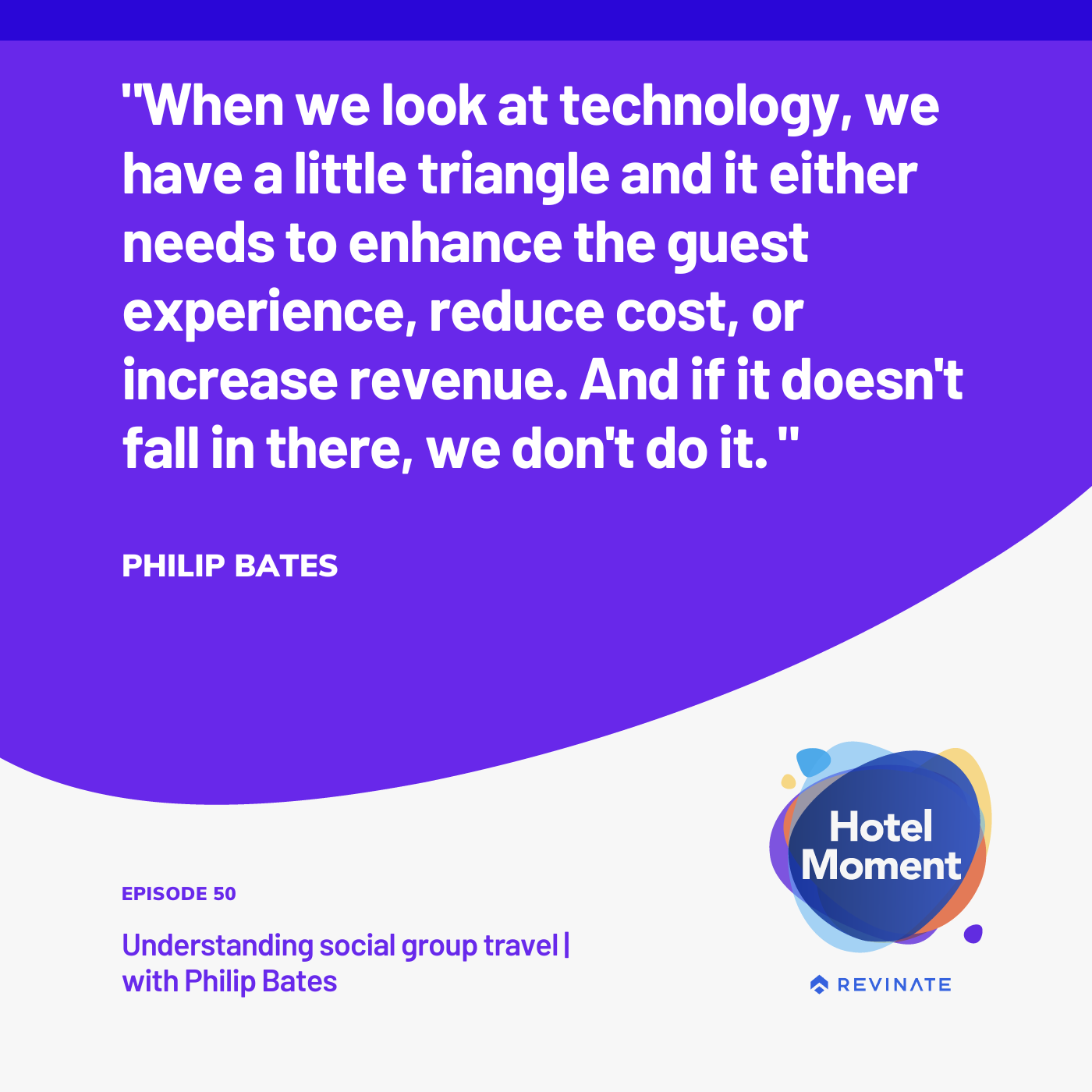
Making informed tech decisions
The history of social group travel
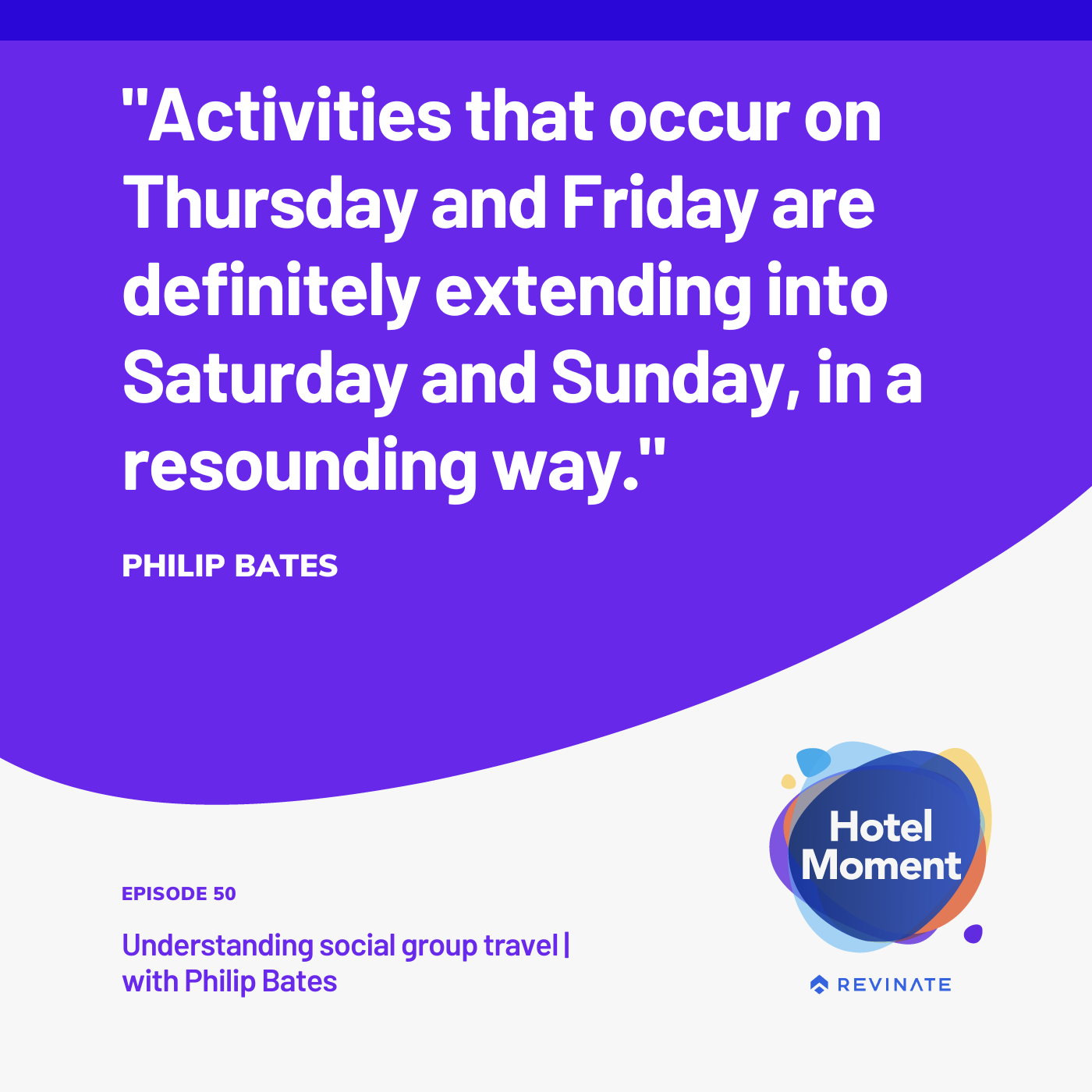
2023 bleisure travel
Adopting hospitality technology
Related episodes


Be the first to know when a new episode drops
This site is protected by reCAPTCHA and the Google Privacy Policy and Terms of Service apply. *Required fields.




